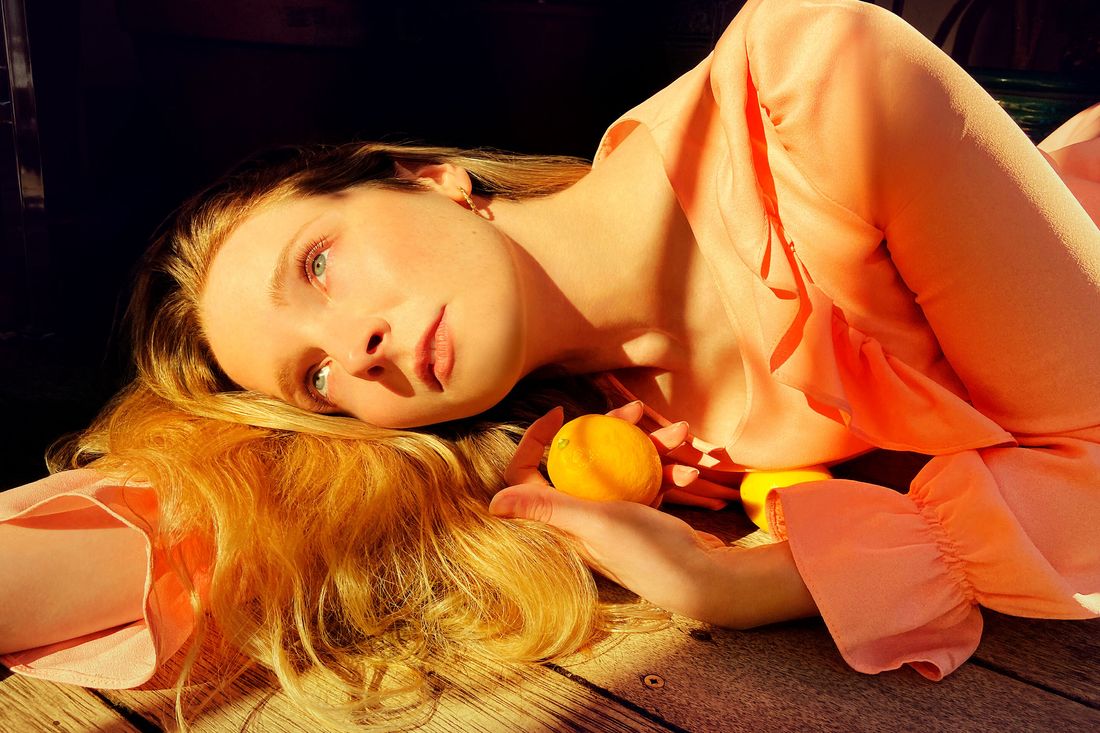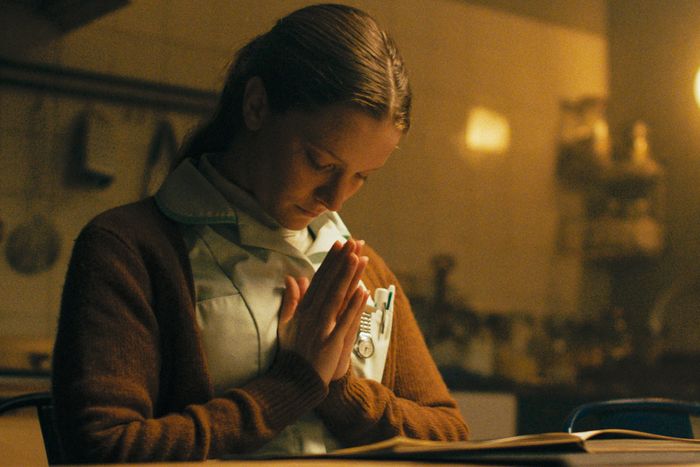
These days, the Welsh actress Morfydd Clark frequently wakes up disoriented, wondering how she got here. Her first leading role, in A24’s latest horror film, Saint Maud, earned her rave advance reviews last year, but as far as the public is concerned, it doesn’t yet exist. Just before the pandemic began, she had moved to the North Island of New Zealand — now one of the only countries in the world to have successfully tempered the spread of COVID-19 — for a role in Amazon’s billion-dollar Lord of the Rings series. Not far from the set are mammoth green mountains, a 500-foot waterfall, and a bubbling mud pool. “It’s hard to decipher what is real and what is a dream,” Clark tells me over a video call. She can’t figure out how to turn off her virtual background, which has applied a distorting effect to her face. As we speak, I am confronted by six eyes and ten brows.
She begins with an apology for her technological struggles and for being late. (“I was just lying in bed anxiety-ing about it!”) Clark is an anxious person, and she hides her nerves under a slightly frantic mix of self-deprecation and humor. She tells me she was a little relieved when she learned, in March, that the press tour for Saint Maud would be canceled and the film’s release delayed. (It’s finally in theaters now, to be followed by a mid-February streaming release.) Playing the lead in an A24 film (Moonlight, Lady Bird, Uncut Gems) is like leveling up into a new echelon of stardom. The production house has been a launchpad for such actresses as Anya Taylor-Joy, Saoirse Ronan, and Florence Pugh. The idea of scores of interviews and glad-handing in Los Angeles felt destabilizing. “When all the wonderful stuff happens, it can feel like you’re in a storm and the waves are taking you every which way,” Clark says.
Over the past few years, the 30-year-old has steadily accumulated capital in the industry. In the summer of 2018, she moved from London back into her parents’ home outside Cardiff while working simultaneously on three projects: the black comedy Eternal Beauty, Armando Iannucci’s The Personal History of David Copperfield, and HBO’s His Dark Materials. The following year, Saint Maud and Copperfield premiered at the Toronto International Film Festival. Up until then, Clark had spent half a decade playing minor roles in small films, TV series, and the occasional stage performance. The auditions felt like a hundred first dates, but when she read the Saint Maud script, she instantly connected with it. In the debut feature from writer-director Rose Glass, she plays Maud, a radically devout Christian hospice nurse who communes with God while struggling with mental illness in a run-down English seaside town. The film follows the caretaker and the American cancer patient she becomes obsessed with saving (portrayed by an elegant and biting Jennifer Ehle). Critics have lauded Clark’s performance as “nerve-shredding” and “mesmeric.” Maud is disturbed and disturbing, and much of that comes through in Clark’s expressive face and increasingly mutilated body. Clark says she found the character in the physical details: “Watching her do things to herself — like pick a scab — was the horror.”
Glass first noticed Clark in 2016’s Jane Austen adaptation Love & Friendship. (At the time, the director was working as an usher at the London theater where the film premiered.) Glass had written her protagonist as oddly tall and more outwardly abnormal, and the diminutive Clark was one of the last actresses to audition for the role. The film’s financiers were concerned she was too sweet, but the director liked that she brought an innocence and softness to the character that she could play against. Eventually, she convinced them Clark could deliver the requisite horror by having her perform a dialogue-free scene in which she “thrashes around on the floor for a while.”
To prepare for the role, Clark studied Matt Spicer’s Ingrid Goes West and Roman Polanski’s Repulsion. She also kept coming back to Ingmar Bergman’s Through a Glass Darkly, which both Glass and Eternal Beauty director Craig Roberts had suggested she watch. She was inspired by the ways those films deal with terror. “When the fear is so real you could easily be dominated by it,” Clark explains. Glass and Roberts were both drawn to the actress’s ability to use her porcelain veneer to hide a fraying mind. “Those are the kind of parts a lot of actors want to have: the characters that seem calm on the surface but are Travis Bickle inside,” Roberts says. “She’s able to get moments in the silence with her reactions. It’s a gift that she has.”
Clark has ADHD, and the stage was the first place it didn’t feel like a burden. She struggled in a traditional classroom setting and, at age 16, dropped out of her Welsh-language school, spending the next year volunteering both as a teacher’s assistant and on a farm. She tried to finish her A levels in chemistry and hoped to become a midwife, but the classroom environment once again overwhelmed her. Her mother could see the psychic toll that attempting to focus was taking on Clark’s childhood, so she gave her mental-health days, on which they would make art or watch VHS tapes of old Jane Austen adaptations. She knew her daughter loved to sing and act, and she helped her apply to the National Youth Theatre of Wales.
In a way, Clark’s years of trying and failing to playact the part of an attentive student had been a theatrical education. “You are often having to pretend to be someone else,” she says. “Lots of the characters I’ve ended up playing have kind of put on a face of respectability.” She was accepted into the three-year program at Drama Centre London in 2010 and signed with an agent while she was there. In 2014, she landed a small role in the prep-school period piece The Falling, starring Maisie Williams and Pugh; the year after, she caught the attention of British critics with her stage performance in Gary Owen’s Violence and Son.
As she has gained the respect of her peers, that feeling of inevitable failure has stuck. “ADHD feeds into impostor syndrome because you’re always fluking doing well and then crashing and burning,” Clark says. “There’s always a feeling that you’re tricking everyone like you occasionally tricked your teachers.” In her mid-20s, she was certain that, after a big break, things would feel different. She knows better now. “It’s so surreal when the things you wouldn’t allow yourself to think of start happening,” she says of fame. “But also you remain the same anxious person.”
This strange year, spent marooned in Auckland, has given Clark a bit of quiet in her restless mind. She speaks haltingly of all things Lord of the Rings, afraid to let slip any unauthorized news. (She’ll reportedly play a young Galadriel, the royal elf portrayed by Cate Blanchett in the Peter Jackson films.) The production can feel like a school trip; the cast is treated like “precious cargo,” their days often passed “doing activities to make us super-fit and ready for everything.” At times, she’s in a “state of the sublime” — until she remembers she’s 11,000 miles from home. “We have this cast who are very homesick in paradise,” she says, “and that’s a very particular kind of feeling.”
In September, Clark attended a Saint Maud premiere at Auckland’s Hollywood Avondale. The film’s reception was glowing, but being in a room full of strangers reminded her how much she missed her family, who are quick to take the piss out of her newfound fame. Her sister makes a point of sending her all the worst tweets about Saint Maud. “I have a really strong group of people who love me but have no respect for me,” Clark says, laughing. “And I think that’s kind of perfect.”
*This article appears in the February 1, 2021, issue of New York Magazine. Subscribe Now!


